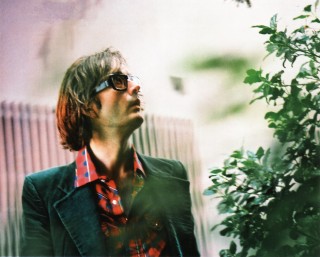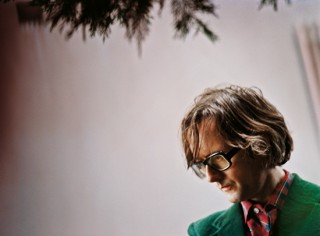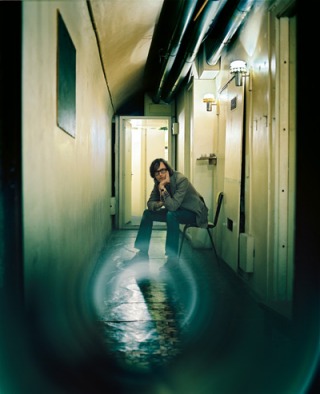 Why Is Jarvis Cocker Trying To Release His Darker Side?
Why Is Jarvis Cocker Trying To Release His Darker Side?Here comes 43-year-old Jarvis Cocker, loping down a Parisian street, still looking like the swingingest librarian in town. But for a minute there, it looked like this whipsmart chronicler of our life and times was lost to us.
After the giddy triumph of 1995's Different Class and the associated whirlwind of telly fame and Glastonbury adulation, the Britpop hangover had bit hard. Cocker parlayed his disgust at the celebrity circus, and his own behaviour therein - opening a Diesel store here, turning up at an Action Man party there - into the bitter comedown album This Is Hardcore. He then tried to convince us that he was on top of the world again with Pulp's final album, We Love Life.
But you could see the truth in Cocker's eyes: he might have waited until his early thirties for recognition, but this big-brained pragmatist was keenly aware that Pop Star was no job for someone knocking on the door of their forties. So Pulp were put on ice and in late 2002 he moved to Paris, to live with his French fashion-stylist wife and her son from a previous relationship. Then, on 24 March 2003, Albert Cocker was born. Cocker père disappeared behind closed doors, to a life of familial quiet, rapprochement with his inner bookworm, and whatever the French word is for recyclable nappies. As happens so rarely in music, dignity won out over desperation...
He admits that the momentous decision to withdraw from music was made easier by the astonishingly lowly performance of Pulp's Hits. This collection of what were, ostensibly, the best songs he'd written only made Number 71 in the album charts. He can laugh about it now but admits he was "Mortified... It's all very well having soul-searching moments, but if nobody's interested, why bother?" he chuckles.
He didn't entirely hang up his round-toed Clarks though. There are ongoing plans to direct a film of his friend Harland Miller's brilliant '70s-set novel Slow Down Arthur, Stick To 30. If you were a diva with an iconic name Gainsbourg (Charlotte), Sinatra (Nancy), Faithfull (Marianne) - you could commission Cocker to write you a song. And there was an album by the mysterious Relaxed Muscle, a ghoulishly attired duo in goth make-up who looked a lot like Cocker and fellow Sheffielder and sometime Pulp guitarist Richard Hawley. "That was another thing of trying to avoid it. If I pretend to be another person..." he begins. Relaxed Muscle managed to release one single, The Heavy, without anyone realising who they were. "Then of course I had to spoil it by performing at the Bethnal Green Working Men's Club. So probably subconsciously - or maybe not even that subconsciously - I probably was wanting to perform. Once I'd got out of the skeleton outfit, I came to accept that fact."
And so it came to pass that, after some hibernation, Jarvis Cocker re-emerged with a solo album. It's called Jarvis. Hawley's on it, as is Pulp bassist Steve Mackey. And it's marvellous. "Now I finally emerge from my chrysalis," he says this wintry Sunday afternoon in grey Paris, his wry wit fuelled by perky coffee. "But am I moth or butterfly? Either way, they only live for about three days."
How did you start to write songs for yourself again?
Ideas would come to me and I would compose the songs in my head without bothering with an instrument. Perhaps because I was still trying to say to myself that I wasn't gonna be a musician anymore. That was quite good because it meant they had to be memorable or catchy, otherwise I wouldn't be able to remember them. Then we bought a piano for the kids to learn, and then they showed no interest. I got in a bad mood - "We're paying fuckin' 15 euros a month for that fuckin' piano..." I played it 'cos nobody else would play it, and wrote some songs on it... I can't play the piano, as you can probably tell from the record.
The song Fat Children paints a fairly gruesome picture. Did having kids of your own make you look at childhood with keener eyes?
It just saddened me. Childhood's supposed to be that thing you get dewy-eyed and nostalgic about, isn't it? And seeing these fat blobs wobbling around, feeling sorry for them - you're fucked before you even start. And wondering why that is. Because I do blame the parents! If you think of what's happened to our generation, people are leaving it later and later to start a family. I just squeezed it in before I was 40. I was in a really negative frame of mind one day, and I just thought, "What the fuck is happening?" People are having kids because they can't hack going out any more, they can't handle the hangovers, they've done drugs, they've tried everything. In desperation they think, "Oh, I'll have a kid and see if that sorts me out. See if that stops me going to the pub every night."
That's a fairly jaundiced view of modern parenthood.
Well as I say, I was in a very negative frame of mind, so I was probably overstating the case. But maybe there's a grain of truth in it. The parents are doing it for themselves, they're not really doing it for the kids. You've got clapped-out parents who are 40, they ain't got the strength to say, "no you can't have that". It's more, "Alright, you can have a litre of Sunny Delight as long as you shut up and put the telly on. As long is it keeps you quiet."
I Will Kill Again also takes a fairly pessimistic view of domestic life, espying all manner of nastiness behind closed doors.
I suppose it's a recurring theme on the record, achieving some kind of acceptance of the darker side of yourself which I think is necessary. It's always the same in the papers, isn't it? "He seemed like a nice bloke, an upstanding member of society, six years of marriage, bludgeons people to death..." If you repress that thing - don't somehow accept or give voice to the dodgy aspects of your character - it builds up and comes out in some kind of explosive, destructive action.

The 'hidden' closing track Running The World - or Cunts Are Still Running The World, as it was known on your MySpace page last summer - was your response to the debates surrounding Live8. Did you agree with the charity concert spectacular?
I don't doubt the good motives and intentions of the people who organised it and performed at it. What I do doubt is the motives of the political leaders who gave lip service to supporting it. As far as I can make out, quite a few of the things the G8 promised to do they haven't actually done... It's that idea that you can change the system from within. They made a big thing of getting people like Bill Gates on board. It was very much saying, "We can make caring capitalism" Well, like it says in the song, "Fuck the morals, does it make any money?" That is the thing with capitalism. If it makes a profit, it's good. If it doesn't it's not good. The way to make a profit is to produce things as cheaply as possible. And one way to produce stuff as cheaply as possible is to pay people fuck-all. That's what used to happen in Great Britain. But now working class people - for want of a better word - are in a weird situation. They're not the ones doing the dirty work, it's people over in ... Macau. The people who were traditionally called the working classes are now the people who are supposed to buy the stuff that's made in Macau.
You seem comfortable writing about class.
I used to think that I was the most apolitical person on the planet. When Pulp started there was as lot of that Red Wedge stuff around, Billy Bragg and that agit-pop stuff like Redskins. It really turned my stomach. So I purposefully avoided any kind of political stuff. Especially in Sheffield, there was loads of it around with it being such a staunchly socialist local council. They were always putting on events. Dolebusters - we played at one. Let's do things for kids on the dole. It was all that kind of clichéd, Thatcher's Britain business. But until I moved away from Sheffield, I didn't really believe that class existed, it wasn't apparent to me. London opened that up to me. Maybe being in Paris has opened it up in a different way as well.
Do you still feel working class?
Well, it's weird. Pulp's last concert was in the Magna Centre outside Sheffield. It used to be a massive steelworks. They've preserved it and made into a museum. They do son et lumière re-enactments of what it would be like pouring out a big vatful of molten steel. Before we did the gig we went for a look around. I found it a very emotional thing - me, never done a fucking day's work in my life! But there was something about it. You kind of knew it was part of your heritage, and to think of all these blokes in there, working in this 'orrible inferno. But at least in some way there was some kind of nobility about it. Then I'm thinking, "Hold on, hold on, don't get nostalgic for a time where people were probably lucky to live past the age of 55 and would come out of that job and be fucked." Same with mining. So you don't wanna get on that nostalgic tip. But at least they were making something rather than sitting on your arse in a call centre."
You recorded the album in Sheffield. What was the thinking behind that?
It wasn't really for any spiritual reason. It was more practical because Richard [Hawley] lives there and he's got loads of guitars. It was easier to go to the guitars rather than get him to bring them all over here. But I was really glad that we did. I did feel like I reconnected with Sheffield. After we'd recorded it I went on a week's holiday driving through the Yorkshire Dales, which I'd probably never done before. It was quite comforting... My wife's always saying, "You're so uncommunicative, you never talk about emotions, you never talk about anything personal."
Except in interviews.
Yeah! And all that kind of thing. And I think, [wearily] "She's right. I probably should go and see somebody and try and work it out." You go back and you spend a week in Yorkshire and you think, "Well, nobody talks about stuff like that there." In fact nobody really talks very much at all. They just kinda get on with it. The biggest compliment you'll get if you do something is, "Oh, that's alright." So it was good to realise that some of the things that you might think are psychological disorders are actually character traits of the place where you were born. So, you know, fuck all that.

You'd been working a long time...
Working's a bit too strong a word. Waiting. Patiently, like in a queue or something.
... OK, but if you waited that long, when fame came along, you could be forgiven for grabbing it lustily with both hands.
Yeah, then you drop it like a red-hot poker. It was funny when Franz Ferdinand got famous. I went to see them in Paris. I suppose 'cos some of the shirts were similar, and 'cos people would say, "Oh they're a bit like Pulp - they did a cover of Mis-Shapes on a radio session early on..." And it was probably some horrible cynical thing inside of me thinking, "Six months' time, they'll all have drug problems and be fighting." Then I saw them six months later in New York and they were still enjoying it and being mates. So I thought, "Well, actually it didn't have to work out like that, it's just you, Jarv. You're just a knobhead."
Are you proud to he British?
[Long pause] I'm happy to be British, I'm quite satisfied with it. Proud of it invites a kind of patriotism and getting behind the flag... That's something I've noticed in being in Paris: there's lots of versions of Britain. That's what makes it interesting. It isn't quite as diverse here. It's a bit more compartmentalised. They shove all the problems out beyond the Périphérique. That's why they had riots last year. Ship people off and hope they don't cause trouble. It's all jumbled up in Britain. But it depends on which Britain you're talking about. The ruling classes and the fact that basically a lot of the population are treated liked serfs? I'm not proud of that.
You suffer from tinnitus these days. What does that sound like?
When I'm tired it gets really bad. It's a constant high-pitched squealing. I got it about two weeks after I turned 40. It just woke me up in the middle of the night. And for no reason - at that point I hadn't been on a stage for a year. It just came out of the blue. It was a comedy thing almost: "OK, you're 40, now you're going to have intimations of mortality. Skreeeeeee..."
How will your 'condition' affect your day job? Earplugs on stage?
I've resisted them. Anything that takes you away from being in the moment is bad. That's what I like about performing. 'Cos I tend to be an overanalytical person in day to day life, being in that situation where you have to be spontaneous and live on your wits, I really like it. I find it very hard to attain that state of being in the moment in normal life.